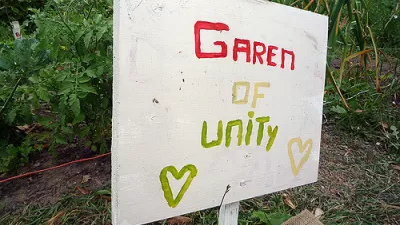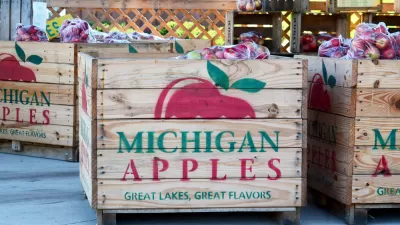Community agriculture this is not. Large scale, urban agriculture is the vision of wealthy businessman and 20-year Detroit resident John Hantz that would transform blighted, East Side's vacant and city-owned properties into a profit-making tree farm.
Matthew Dolan writes of John Hantz' ambitious proposal that counts many backers, including Mayor . Since his initial proposal, Hantz has downsized to "200 acres to start". It's gaining supporters, including Mayor Dave Bing.
While other Rust Belt cities have vacant properties, none are in the scale of Detroit.
From Interactive Graphic - Motor City Vacancy: "After losing more than 1 million residents since 1950, Detroit has a greater share of vacant land - by some estimates 40 square miles, or more than a quarter of the city's 139 square miles - than almost any other U.S. city. Dozens of groups are using some of these empty lots to grow crops. Select icons (in graphic) to see proposed and existing projects."
"Detroit has more than 200,000 vacant parcels-almost half of them residential plots-that generate no significant tax revenue and would cost more to maintain than the city can afford. Finding new uses for this land has become one of the most pressing challenges for a city that lost a quarter of its population in the past decade."
Hantz proposes to purchase "about 2,300 parcels and planting oak trees, then maybe fruit orchards and hydroponic vegetables. The hardwoods could be harvested and sold within a decade to customers looking for young trees, according to Hantz Farms."
Among the urban agriculture community, Hantz Farms is a mixed-bag.
A small-scale organic farmer quoted in the article states that "the value of Detroit's land lies not in its profit potential, but in 'community-building (and) green spaces"
Watch Matthew Dolan's Video: "A Tree Grows In Detroit" on Hantz Farms proposal.
Note: WSJ links may be time-limited without subscription.
FULL STORY: New Detroit Farm Plan Taking Root

Planetizen Federal Action Tracker
A weekly monitor of how Trump’s orders and actions are impacting planners and planning in America.

Maui's Vacation Rental Debate Turns Ugly
Verbal attacks, misinformation campaigns and fistfights plague a high-stakes debate to convert thousands of vacation rentals into long-term housing.

San Francisco Suspends Traffic Calming Amidst Record Deaths
Citing “a challenging fiscal landscape,” the city will cease the program on the heels of 42 traffic deaths, including 24 pedestrians.

Defunct Pittsburgh Power Plant to Become Residential Tower
A decommissioned steam heat plant will be redeveloped into almost 100 affordable housing units.

Trump Prompts Restructuring of Transportation Research Board in “Unprecedented Overreach”
The TRB has eliminated more than half of its committees including those focused on climate, equity, and cities.

Amtrak Rolls Out New Orleans to Alabama “Mardi Gras” Train
The new service will operate morning and evening departures between Mobile and New Orleans.
Urban Design for Planners 1: Software Tools
This six-course series explores essential urban design concepts using open source software and equips planners with the tools they need to participate fully in the urban design process.
Planning for Universal Design
Learn the tools for implementing Universal Design in planning regulations.
Heyer Gruel & Associates PA
JM Goldson LLC
Custer County Colorado
City of Camden Redevelopment Agency
City of Astoria
Transportation Research & Education Center (TREC) at Portland State University
Jefferson Parish Government
Camden Redevelopment Agency
City of Claremont





























